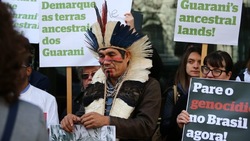
Ladio Veron leads a demonstration outside the Brazilian embassy in London (Pic: Survival/Eleanor K Russell)
Brazilian indigenous leader appeals for solidarity against land grabs
By Lucy EJ Woods
“They use tractors with big chains to cut down everything.” Ladio Veron, leader of the Guarani-Kaiowá people, is describing the expansion of agribusiness in Brazil.
“They poison the rivers and the land,” Veron tells Climate Home. “They plant more and more, for sugar cane and refineries,” and when the sugar cane fields are burned to make the crop easier to harvest, the smoke “is like an atomic bomb exploding”.
Veron is touring Europe to appeal for solidarity against violent takeovers of indigenous land for soya and sugar cane plantations, and cattle ranches. For him, it is deeply personal: his father Marcos Veron was murdered in a territorial dispute.
The state of Brazil recognises 13.8% of its territory as indigenous land (1,173,106 square kilometres, an area five times the size of the United Kingdom). But the Kaiowá are being driven out of their lawfully recognised land in Mato Grosso do Sul.
Brazilian NGO Conselho Indigenista Missionario (Indigenous Missionary Council or Cimi), documents the violence. A 2015 report counts 754 killings of indigenous leaders in Brazil between 2003 and 2014. Out of these, 390, more than half, occurred in Mato Grosso do Sul.
Exclusive: Worst land-related killings in decades expose Amazon’s lawless frontier
Without access to their lands, the Guarani can’t hunt or fish, or plant enough crops to feed themselves. Since 2005, according to NGO Survival International, 53 Guarani children have died of starvation.
Instead, the Kaiowá often live in makeshift tents and shacks, in small camps between the fenced off plantations and busy motorways.
“Each of the roadside camps is tiny, maybe 180 metres by 40 or 50 metres, smaller than a football pitch,” Sarah Shenker, senior campaigner at Survival International told Climate Home. There might be 15 to 100 people living on each patch of land. “There is no space. No clean water, constant illness,” says Shenker.
As a result, the Kaiowá people have the highest suicide rate in the world. Since 1986, Survival International has documented 517 Guarani suicides – the youngest reported to be nine years old. The UN described the situation as a humanitarian crisis.
In a bid for international support, Veron is visiting the UK, Greece, Italy, Portugal, Ireland, Germany, Austria, Switzerland, France, Belgium and Spain. While visiting the UK, Veron spoke at SOAS University, protested outside the Brazilian embassy, and spoke with the UK Joint Committee on Human Rights.
Senior lecturer in the theory, policy and practice of development at SOAS University, Leandro Vergara Camus, called the tour “an extraordinary measure”.
Survival International’s director Stephen Corry said at the protest outside the UK’s Brazilian embassy that “tribal people are dying as Brazilian politicians deliberately allow ranchers and soya barons to steal and destroy Indian territory”.
Report: “Beef caucus” takes over indigenous policies in Brazil
The agribusiness lobby in Brazil is deeply influential, fighting any environmental and indigenous rights laws that could limit the sector’s expansion.
Justice minister Osmar Serraglio, who is responsible for demarcating indigenous territory, has told indigenous people to stop demanding land rights. Shortly after taking office in March, he said: “We’re going to provide them with decent living standards. We’re going to stop discussing land. Does land keep anyone’s belly full?”
Last month Congress rolled back protection for 1.1 million hectares of forest and national park. The environment ministry has also had its budget cut by 51%, raising questions over how it can enforce forest protections.
There is evidence indigenous territories have lower deforestation rates. Veron says his people would take better care of the environment. “We are nature, it is in our songs, our chanting, our spirituality. When we go back to our land we will bring back the forest, our whole life is in the forest.”
Ranchers and plantation owners employ private security guards to keep out the Kaiowá. “They are hired to intimidate,” says Shenker. In the camps, “you can hear gunshots all day and night.”
The Cimi report states indigenous people in camps “were shot, and some were tortured. In some cases the camps were destroyed”.
When someone is shot, “first, there is chaos,” says Shenker. “People run away into any nearby forest. This is how people get dispersed and go missing. No one knows where they are. It also means that it takes a while to get the news of the killing out.”
Once news of a killing reaches organisations on the ground it is reported to the police.
“In theory, the police should then investigate. Sometimes they do, sometimes it is not clear if they investigate or not. But either way, it doesn’t get far, the police put in no effort,” says Shenker. There is “hardly ever a result, an arrest, or anyone going to prison”.
Weekly briefing: Sign up for your essential climate news update
After years of working as a campaigner, Shenker can only recall one case where a suspect ended up in a court room: the suspected murderer of Veron’s father, Marcos Veron.
In a common area at SOAS’s London campus, Veron wrings his hands and picks at his fingernails. Looking at his feet, he says quietly: “someone claiming to own the land hired people to kill my father.”
Marcos Veron’s suspected killer was convicted of lesser crimes, then released from prison early, says Shenker. “Once they are in the courtroom, they have connections, they are not convicted of murder… There is a culture of impunity.”
One of the key aims of the European tour, says Veron, is getting observers to document what is happening in Brazil. When asked why Europeans are required, Veron replies, “all of our people, all our writers, they get killed”.
“Public pressure does usually work,” says Shenker. “By far the best way [for Europeans] to stop this is to watch and then join in with activism, to write emails and letters, and to spread the word.”












